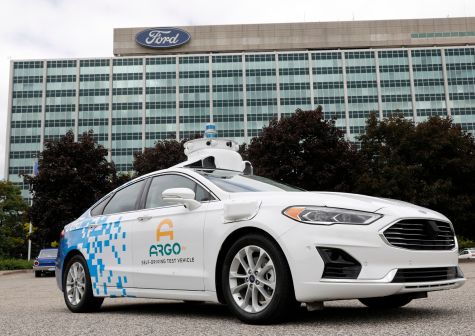Transportation officials urge a greater focus on making connected cars work on city streets

City transportation officials want federal and state leaders to take a city-centric approach to setting policy around connected cars, pushing for more research on autonomous vehicles that can navigate complex city streets and more authority to craft rules for the technology.
The National Association of City Transportation Officials released a policy statement on connected vehicles Thursday, detailing changes that they want from lawmakers and regulators when it comes to autonomous car policy.
“Instead of adapting our cities to accommodate new transportation technologies, we need to adapt new transportation technologies to our cities in ways that make them safer, more efficient, and better places to live and work,” said Janette Sadik-Khan, the association’s chair and the former commissioner of New York City’s Department of Transportation, said in a statement. “Autonomous vehicles offer a once-in-a-lifetime opportunity to reset our streets and address the fundamental issues of traffic safety, congestion, and mobility as our cities grow ever larger.”
Indeed, the group’s analysts write that federal and state officials need to consider that “policy at every level of government should address head-on the destructive potential for increased traffic, emissions from additional driving, and on-street congestion that could easily result from automated vehicle technology.”
Accordingly, the association believes that policymakers need to stress safety and equity in the development of the vehicles, while also encouraging the development “shared, automated and electric vehicles” to cut down on the environmental impact of the technology.
To realize those goals, the organization wants to see city transportation officials included in “all planning processes at the national and state levels,” since “many discussions of regulatory action have taken place in state legislatures or at departments of motor vehicles, which have limited experience with street operations.”
“Automated vehicles have the potential to radically change transportation systems, but cities must be involved in state and federal policymaking to ensure this new technology meets public needs,” said Scott Kubly, director of the Seattle Department of Transportation and NACTO’s vice president. “Growing cities like Seattle need policies that make automated vehicles part of our strategy for flexible, shared mobility.”
[Read more: Pennsylvania bill aims to set connected car standards, kickstart testing]
With more city officials in the fold, the group’s analysts think lawmakers and regulators will better understand the value of research into connected car technology that will work in cities. While many studies have focused on how the vehicles could work on highways, the association feels that “city streets are the locus of the most complex problems for automated vehicles,” and governments of all sizes should direct research funding to this issue.
“Research should address any needs for on-street infrastructure in the city environment and how to cover those costs,” the analysts wrote.
But if policymakers are going to focus on highways, then the association hopes to see them shift their thinking about expressways “from expansion to modernization and management.”
“Existing lanes on expressways will be able to accommodate significantly more vehicles if they are able to platoon through connected technology, making new physical capacity unnecessary in the near future,” the analysts wrote.
As leaders consider all these policies, the association stresses that the safety of passengers and pedestrians should be their primary concern. The group hopes that officials consider how the technology can help support efforts like “Vision Zero,” the nationwide push to end all pedestrian traffic deaths, by doing things like restricting connected vehicles to speeds of 25 miles per hour or less on city streets and barring the use of any “partially automated vehicles” in cities until the technology can be perfected.
But the association also sees a role for the companies building these connected vehicles. The analysts want to see more data sharing between governments and carmakers, and they feel “public policies should foster open data platforms that enable robust private innovation to better serve transportation customer needs, while reducing aggregate social and environmental costs and inequities through a regulated utility model framework.”
Above all, the analysts want policymakers to plan for the advent of connected cars to begin “from the inside out,” taking cities into consideration every step of the way.
“Planning should begin with a vision for the future city and put resources into solving for the best methods for providing mobility in low, medium, and high density corridors and environments,” the analysts wrote.
Contact the reporter at alex.koma@statescoop.com, and follow him on Twitter @AlexKomaSNG.






